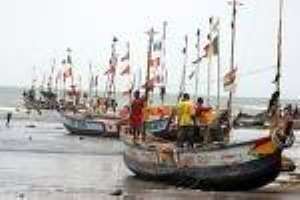
Stakeholders from the artisanal fishing sector in the Central Region have deliberated on a recent research study conducted under a three-year, EU-funded project dubbed: "Far Dwuma Nkodo" or "Securing Sustainable Fisheries".
The study carried out by project partner, Hen Mpoano, provides detailed insights into the challenges facing small-scale fishers in Ghana today.
A statement issued by the organizers said among the key threats identified were collisions between canoes and industrial fishing vessels and the destruction of artisanal fishing gear, in some cases within the zone reserved for artisanal fishers.
In 2016 alone, the study counted thousands of cases of industrial vessels destroying nets and canoes of artisanal fishermen at sea.
It said yet only around five percent of these cases were reported to the Fisheries Commission, and even fewer cases (around one percent of the total) resulted in compensation for the losses incurred.
The statement said according to the fishers surveyed, they were often unable to bring claims in such cases due to difficulties identifying the offending vessel.
According to Mr. Daniel Ennien, a fisherman at Egyaa: 'I went out for an expedition last week Monday dawn with my team and after setting our net a fishing vessel passed through our zone and destroyed it".
He said they did not just destroy their gears, but they also stole the fish that belongs to those of them with the small canoes and now "I am jobless and I don't know how I will manage to take care of my wife and children.'
'I have decided to take the vessel to the shrine and curse it to sink in the ocean because they are heartless,' he added.
It said Hen Mpoano and the Environmental Justice Foundation (EJF), who were partnering on the project, brought together around 50 Chief Fishermen from across the Central Region, as well as representatives of fisher and fishmonger Associations, to deliberate the findings of the study and ensure they represented accurately the picture on the ground.
It said the findings would form a baseline against which the Far Dwuma Nkodo project will measure the impact of its interventions over the coming years.
The project is working to improve the lives of artisanal fisherfolk and help Ghana restore its dwindling fish stocks.
Mr. Antoine Rougier, who is coordinating the project on behalf of EJF, explained that a total of 44 fishing communities in the Central Region and 15 fishing communities in the Volta river estuary in Ada, would benefit from activities under the project.
He indicated that the focus of the project's interventions would be on vulnerable, disenfranchised fishermen and women who were considered to be most at risk of the impacts of illegal fishing and declining fish stocks.
'EJF and Hen Mpoano will support communities to document and report cases of industrial fishing vessels operating illegally in the Inshore Exclusion Zone reserved for traditional fishermen," he said.
He said this would include training communities in smartphone technologies to enable the gathering of visual evidence that could be shared with all stakeholders, and ensure that this was brought to the attention of the enforcement authorities.
Mr. Balertey Gormey, a Senior Programme Officer at Hen Mpoano, highlighted the need to reinforce traditional mechanisms for fisheries management and enforcement.
'It is promising that most communities surveyed are keen to form voluntary committees with legal backing to fight illegal fishing that is heavily impacting catches in their fishing grounds,' he said.
'Actions at the local level must be supplemented by effective and transparent action by the Ministry of Fisheries to combat illegal and destructive practices of the industrial fleet and to ensure fishers are compensated for losses resulting from conflicts at sea. The Far Dwuma Nkodo project is ready to collaborate with the Ministry to address the challenges facing Ghana's fishing sector,' he added.
Small-scale fisheries contribute significantly to national GDP and employ 80 percent of fishers in the country, but are under threat from competition with industrial vessels, and vast over-capacity in the fishing sector.
Populations of small pelagic have collapsed over the past 20 years, threatening the food security of the nation and the livelihoods of over two million people engaged, directly or indirectly, in the artisanal fishing sector.




 We’ll no longer tolerate your empty, unwarranted attacks – TUC blasts Prof Adei
We’ll no longer tolerate your empty, unwarranted attacks – TUC blasts Prof Adei
 Bawumia donates GHc200,000 to support Madina fire victims
Bawumia donates GHc200,000 to support Madina fire victims
 IMF to disburse US$360million third tranche to Ghana without creditors MoU
IMF to disburse US$360million third tranche to Ghana without creditors MoU
 Truck owner share insights into train collision incident
Truck owner share insights into train collision incident
 Paramount chief of Bassare Traditional Area passes on
Paramount chief of Bassare Traditional Area passes on
 Two teachers in court over alleged illegal possession of BECE papers
Two teachers in court over alleged illegal possession of BECE papers
 Sunyani: Victim allegedly shot by traditional warriors appeals for justice
Sunyani: Victim allegedly shot by traditional warriors appeals for justice
 Mahama vows to scrap teacher licensure exams, review Free SHS policy
Mahama vows to scrap teacher licensure exams, review Free SHS policy
 Government will replace burnt Madina shops with a new three-story, 120-store fac...
Government will replace burnt Madina shops with a new three-story, 120-store fac...
